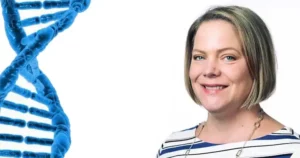Sickle cell anemia is caused by a mutation on the hemoglobin beta gene. A child can inherit cystic fibrosis if both parents are carriers of the recessive CFTR gene. Carriers of the BRCA1 or 2 genes are at increased risk of developing breast cancer.
If your family has any history of health problems, it can he be helpful to speak with a genetic counselor.
“A genetic counselor is a health care provider,” Susan Manley explained. “Genetic counselors talk with and evaluate patients, look at their family history, and look for evidence of inherited genetic conditions in the family history. They help them understand what their risk may be for that condition, and then offer and explore genetic testing.”
Anyone can speak with a genetic counselor, but counselors most often work with patients who have genetic disorders, expectant parents who want to understand their child’s genetic risk factors, and patients who are at risk for diseases that may have a genetic component, like cancer or cardiovascular disease.
For Manley, a UWM alumna who majored in biology, being a genetic counselor has been a rewarding career because she’s been able to combine her love of science with her love of working with people. But these days, she’s much more than a genetic counselor: She’s the Senior Vice President of Medical Services at Myriad Genetics, a company that develops and sells genetic tests for a, well, myriad of genetic conditions. Myriad is also credited with discovering the BRCA1 and BRCA2 gene mutations.
In her role, Manley leads Myriad’s centralized medical support for all of the products the company offers. She oversees a team of 69 genetic counselors who work with patients and healthcare providers.
Manley started her science journey in Lapham Hall, where she worked for then-Professor Ruth Phillips. Manley took the job because it was part of her financial aid package, but she found a love of science in Dr. Phillips’ lab. Her favorite job was feeding the fish that Phillips studied. They lived in huge tanks in the basement of Lapham Hall, and Manley used to deliver their food before she went out on the town with friends on Friday nights.
As she grew closer with Phillips, Manley began to learn more lab procedures and was even included on some of Phillips’ publications. But she found her true calling when she decided to take a human genetics course with Phillips.
“I took it because I loved her, and I thought, well, she’s not going to fail me out of a class,” Manley joked. “But I loved it. It combined … biology and human health and being able to observe things, think critically about them, and understand the impact they had on people.”
With her interest in genetics, several career options lay before Manley, but after doing a job-shadow with some geneticists at Children’s Hospital, she decided to become a genetic counselor. She earned her Master’s degree at the University of Cincinnati and was almost immediately hired by Myriad Genetics upon graduating. At the time, about 28 years ago, the company was a small genetic research firm and had just publicized its discovery of the BRCA1 and BRCA2 genes.
As Myriad wanted to branch out into manufacturing and selling genetic tests, they needed a genetic counselor who could advise them on how to market the tests and communicate with health care providers and patients about what the results meant. Manley signed on when the company had less than 50 employees.
Today, Myriad is an international company with over 2,000 employees. As the organization grew, so did Manley’s responsibilities. She transitioned into a job as a sales representative, where she eventually was in charge of the eastern seaboard region. She earned an MBA and was later promoted to her current position. Though she’s no longer “just” a genetic counselor, Manley doesn’t think her job has changed too much.
“I went into genetic counseling because the science was fascinating, but I really wanted to work with people. It’s about working with people to help them make good decisions, whether you do that one-on-one as a genetic counselor, or you help your managers and employees do their best,” she said.
She credits UWM with helping her start on the path to success.
“UWM holds a very special place in my heart, and I had such a good experience there. I entered without a plan and left with everything I needed to be successful for the next three decades,” Manley reflected. “It’s because of UWM and Ruth Phillips.”
After all, a good counselor, genetic or otherwise, can make all the difference.
By Sarah Vickery, College of Letters & Science
